#like Aziraphale is really bad a magic
Text
We all need to take a page out of Aziraphale’s book by being passionately bad at something. Because that's literally the only way you're going to improve at your favorite hobbies.

#from now on every word i write is gold#good or bad#because if i believe it's good it will be#eventually#good omens#good omens 2#good omens season 2#aziraphale#crowley#ineffable husbands#like Aziraphale is really bad a magic#but he loves it and it makes him happy#that's all that matters
38 notes
·
View notes
Text
'...“It’s fun playing bad, but actually he’s not,” the actor says, smiling as he reflects on his character, Crowley. “He’s a villain with a heart. The amount of really evil things he does are vanishingly small.”
...As it always has, “Good Omens” dissects the view of good and evil as absolutes, showing viewers that they are not as separate as we were led to believe growing up. Aziraphale and Crowley’s long-standing union is proof of this. The show also urges people to look at what defines our own humanity. For Tennant — who opted to wear a T-shirt emblazoned with the words “Leave trans kids alone you absolute freaks” during a photocall for Season 2 — these themes are more important now than ever before.
“In this society that we’re currently living in, where polarization seems ever more present, fierce and difficult to navigate. Negotiation feels like a dirty word at times,” he says, earnestly. “This is a show about negotiation. Two extremes finding common ground and making their world a better place through it. Making life easier, kinder and better. If that’s the sort of super objective of the show, then I can’t think of anything more timely, relevant or apt for the rather fractious times we’re living in.”
“Good Omens” is back by popular demand for another season. How does it feel?
It’s lovely. Whenever you send something out into the world, you never quite know how it will land. Especially with this, because it was this beloved book that existed, and that creates an extra tension that you might break some dreams. But it really exploded. I guess we were helped by the fact that we had Neil Gaiman with us, so you couldn’t really quibble too much with the decisions that were being made. The reception was, and continues to be, overwhelming.
Now that you’re no longer bound by the original material that people did, perhaps, feel a sense of ownership over, does the new content for Season 2 come with a sense of freedom for you? This is uncharted territory, of sorts.
That’s an interesting point. I didn’t know the book when I got the script. It was only after that I discovered the worlds of passion that this book had incited. Because I came to it that way, perhaps it was easier. I found liberation from that, to an extent. For me, it was always a character that existed in a script. At first, I didn’t have that extra baggage of expectation, but I acquired it in the run-up to Season 1 being released… the sense that suddenly we were carrying a ming vase across a minefield.
In Season 2, we still have Neil and we also have some of the ideas that he and Terry had discussed. During the filming of the first one, Neil would drop little hints about the notions they had for a prospective sequel, the title of which would have been “668: The Neighbour of the Beast,” which is a pretty solid gag to base a book around. Indeed there were elements like Gabriel and the Angels, who don’t feature in the book, that were going to feature in a sequel. They were brought forward into Season 1. So, even in the new episodes, we’re not entirely leaving behind the Terry Pratchett-ness of it all.
It’s great to see yourself and Michael Sheen reunited on screen as these characters. Fans will have also watched you pair up for Season 3 of “Staged.” You’re quite the dynamic duo. What do you think is the magic ingredient that makes the two of you such a good match?
It’s a slightly alchemical thing. We knew each other in passing before, but not well. We were in a film together [“Bright Young Things,” 1993] but we’d never shared a scene. It was a bit of a roll of the dice when we turned up at the read-through for “Good Omens.” I think a lot comes from the writing, as we were both given some pretty juicy material to work with. Those characters are beloved for a reason because there’s something magical about them and the way they complete each other. Also, I think we’re quite similar actors in the way we like to work and how we bounce off each other.
Does the shorthand and trust the two of you have built up now enable you to take more risks on-screen?
Yes, probably. I suppose the more you know someone, the more you trust someone. You don’t have to worry about how an idea might be received and you can help each other out with a more honest opinion than might be the case if you were, you know, dancing around each other’s nervous egos. Enjoying being in someone’s orbit and company is a positive experience. It makes going to work feel pleasant, productive, and creative. The more creative you can be, the better the work is. I don’t think it’s necessarily a given that an off-screen relationship will feed into an on-screen one in a positive or negative way. You can play some very intimate moments with someone you barely know. Acting is a peculiar little contract, in that respect. But it’s disproportionately pleasurable going to work when it’s with a mate.
Fans have long discussed the nature of Crowley and Aziraphale’s relationship. In Season 2, we see several of the characters debate whether the two are an item, prompting them to look at their union and decipher what it is. How would you describe their relationship?
They are utterly co-dependent. There’s no one else having the experience that they are having and they’ve only got each other to empathize with. It’s a very specific set of circumstances they’ve been dealt. In this season, we see them way back at the creation of everything. They’ve known each other a long time and they’ve had to rely on each other more and more. They can’t really exist one without the other and are bound together through eternity. Crowley and Aziraphale definitely come at the relationship with different perspectives, in terms of what they’re willing to admit to the relationship being. I don’t think we can entirely interpret it in human terms, I think that’s fair to say.
Yet fans are trying to do just that. Do you view it as beyond romantic or any other labels, in the sense that it’s an eternal force?
It’s lovely [that fans discuss it] but you think, be careful what you wish for. If you’re willing for a relationship to go in a certain way or for characters to end up in some sort of utopian future, then the story is over. Remember what happened to “Moonlighting,” that’s all I’m saying! [Laughs]
Your father-in-law, Peter Davison, and your son, Ty Tennant, play biblical father-and-son duo Job and Ennon in Episode 2. In a Tumblr Q&A, Neil Gaiman said that he didn’t know who Ty’s family was when he cast him. When did you become aware that Ty had auditioned?
I don’t know how that happened. I do a bunch of self-tapes with Ty, but I don’t think I did this one with him because I was out of town filming “Good Omens.” He certainly wasn’t cast before we started shooting. There were two moments during filming where Neil bowled up to me and said, “Guess, who we’ve cast?” Ty definitely auditioned and, as I understand it, they would tell me, he was the best. I certainly imagine he could only possibly have been the best person for the job. He is really good in it, so I don’t doubt that’s true. And then my father-in-law showed up, as well, which was another delicious treat. In the same episode and the same family! It was pretty weird. I have worked with both of them on other projects, but never altogether.
There’s a “Doctor Who” cameo, of sorts, in Episode 5, when Aziraphale uses a rare annual about the series as a bartering tool. In reality, you’ll be reprising your Time Lord role on screen later this year in three special episodes to mark the 60th anniversary. Did you always feel you’d return to “Doctor Who” at some point?
There’s a precedent for people who have been in the series to return for a multi-doctor show, which is lovely. I did it myself for the 50th anniversary in 2013, and I had a wonderful time with Matt [Smith]. Then, to have John Hurt with us, as well, was a little treat. But I certainly would never have imagined that I’d be back in “Doctor Who” full-time, as it were, and sort of back doing the same job I did all those years ago. It was like being given this delightful, surprise present. Russell T Davies was back as showrunner, Catherine Tate [former on-screen companion] was back, and it was sort of like the last decade and a half hadn’t happened.
Going forward, Ncuti Gatwa will be taking over as the new Doctor. Have you given him any advice while passing the baton?
Oh God, what a force of nature. I’ve caught a little bit of him at work and it’s pretty exciting. I mean, what advice would you give someone? You can see Ncuti has so much talent and energy. He’s so inspired and charismatic. The thing about something like this is: it’s the peripherals, it’s not the job. It’s the other stuff that comes with it, that I didn’t see coming. It’s a show that has so much focus and enthusiasm on it. It’s not like Ncuti hasn’t been in a massive Netflix series [“Sex Education,”] but “Doctor Who” is on a slightly different level. It’s cross-generational, international, and has so much history, that it feels like it belongs to everyone.
To be at the center of the show is wonderful and humbling, but also a bit overwhelming and terrifying. It doesn’t come without some difficulties, such as the immediate loss of anonymity. It takes a bit of getting used to if that’s not been your life up to that point. I was very lucky that when I joined, Billie Piper [who portrayed on-screen companion, Rose] was still there. She’d lived in a glare of publicity since she was 14, so she was a great guide for how to live life under that kind of scrutiny. I owe a degree of sanity to Billie.
Your characters are revered by a few different fandoms. Sci-fi fandoms are especially passionate and loyal. What is it like being on the end of that? I imagine it’s a lot to hold.
Yes, certainly. Having been a fan of “Doctor Who” since I was a tiny kid, you’re aware of how much it means because you’re aware of how much it meant to you. My now father-in-law [who portrayed Doctor Who in the 80s] is someone I used to draw in comic strips when I was a kid. That’s quite peculiar! It’s a difficult balance because on one end, you have to protect your own space, and there aren’t really any lessons in that. That does take a bit of trial and error, to an extent, and it’s something that you’re sometimes having to do quite publicly. But, it is an honor and a privilege, without a doubt. As you’ve said, it means so much to people and you want to be worthy of that. You have to acknowledge that and be careful with it. Some days that’s tough, if you’re not in the mood.
I know you’re returning to the stage later this year to portray Macbeth. You’ve previously voiced the role for BBC Sounds, but how are you feeling about taking on the character in the theater?
I’m really excited about it. It’s been a while since I’ve done Shakespeare. It’s very thrilling but equally — and this analogy probably doesn’t stretch — it’s like when someone prepares for an Olympic event. It does feel like a bit of a mountain and, yeah, you’re daring to set yourself up against some fairly worthy competition from down the years. That’s both the challenge and the horror of doing these types of things. We’ve got a great director, Max Webster, who recently did “Life of Pi.” He’s full of big ideas. It’s going to be exciting, thrilling, and a little bit scary. I’m just going to take a deep breath.
Before we part ways, let’s discuss the future of “Good Omens.” Gaiman has said that he already has ideas for Season 3, should it happen. If you were to do another season, is there anyone in particular you’d love to work with next time around or anything specific you’d like to see happen for Crowley?
Oh, Neil Gaiman knows exactly where he wants to take it. If you’re working with people like Gaiman, I wouldn’t try to tamper with that creative void. Were he to ask my opinion, that would be a different thing, but I can’t imagine he would. He’s known these characters longer than me and what’s interesting is what he does with them. That’s the bit that I’m desperate to know. I do know where Crowley might end up next, but it would be very wrong if I told you.
[At this point, Tennant picks up a pencil and starts writing on a hotel pad of paper.]
I thought you were going to write it down for me then. Perhaps like a clandestine meeting on a bench in St James’ Park, but instead you’d write the information down and slide it across the table…
I should have done! I was drawing a line, which obviously, psychologically, I was thinking, “Say no more. You’re too tempted to reveal a secret!” It was my subconscious going “Shut the fuck up!”
#David Tennant#Michael Sheen#Good Omens#Neil Gaiman#Terry Pratchett#Ty Tennant#Peter Davison#Aziraphale#Crowley#Doctor Who#Macbeth#Ncuti Gatwa#Job#Ennon#Bright Young Things#Series 2#Matt Smith#John Hurt#Russell T. Davies#Catherine Tate#Max Webster#Life of Pi#Sex Education#Billie Piper#Rose Tyler#BBC Sounds
3K notes
·
View notes
Text
honestly I think I forgot that good omens is a comedy?
like just unreasonably goofy and ineffably silly?
aziraphale dancing around with a feather boa and being adorably proud of his magic tricks?
crowley being really into ducks for no discernable reason?
they dance as an apology when they put themselves in danger?
they try to stop the apocalypse by raising a child in disguises they really didn't need because the Dowlings have never seen them before?
the antichrist's reasoning for nuclear energy being bad is that it wasn't green and bubbling?
like yeah a lot of stuff in this show are so heartbreaking and have torn my own heart out many times over, but I'm taking this rewarch to just appreciate the surface silliness when I can without looking too deep into it.
#ive really been analyzing a lot recently and wanted a break#so im rewatching the show i analyze ofc#but when i just watch and enjoy instead of carefully scanning each frame i can appreciate just how goofy this is#good omens#aziracrow#ineffable husbands#crowley#aziraphale
574 notes
·
View notes
Text
Holy forking shirtballs
I'm choosing violence today. I started this on Twitter, but I'm going to finish my thoughts here like I always do.
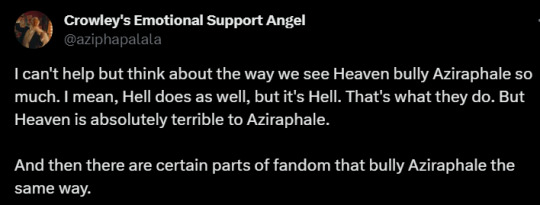
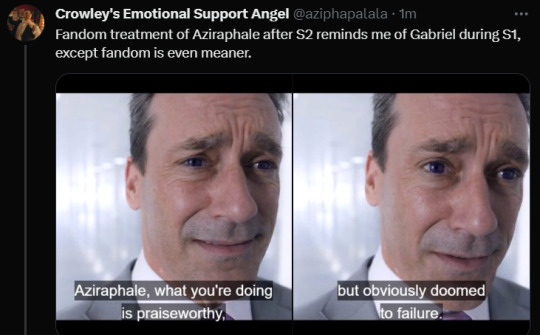
But what really blows my mind the most is the way that people look at Aziraphale's "choice" at the end, as if he had one to fucking begin with.
I'm sorry, but Aziraphale knows how messed up Heaven is. He told The Metatron, more than once, that he did not want to go back to Heaven! We can debate what each of us means by "choice" all night because my "choice" and your "choice" might be two different concepts. He could have been strong armed by The Metatron or he could have looked at where things were headed and realized he had no choice but to intervene himself.

You need to ask yourself what Aziraphale has a moral imperative to do.
What do we owe to each other?
Seriously, if you have not watched The Good Place, I recommend you go and watch it, because it absolutely shaped how I've viewed Good Omens 2 since its release.
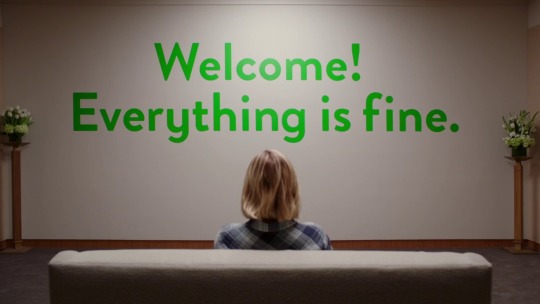
My levels of frustration with the bad faith mischaracterizations of Aziraphale are off the charts. If you are blaming him for everything, implying that he should have to grovel and that Crowley has a right to hurt him back, you have missed the point of Good Omens entirely.
I defend Aziraphale, but I don't think one of them is more right or wrong than the other. They're equals. They're a group of the two of them, acting and reacting to each other throughout history. They're Alpha Centauri.

I cannot even begin to explain how fucking devastated I felt when Crowley said these words, knowing he was fighting a losing battle. What he said took a lot of courage because he's finally admitting something they've both been too scared to publicly define for 6,000 years. Crowley has had to spend so long with a rough outer shell because he fell and had to hide all of his softness.
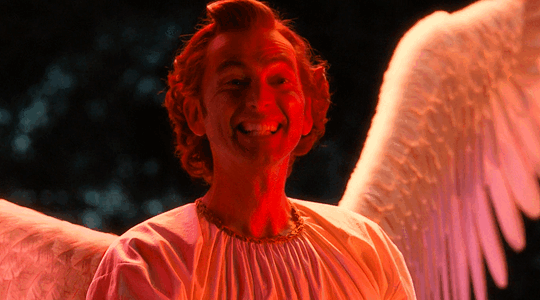
The look on his face was one of pure joy when he created that nebula, but I think the fact that he got to share that moment with Aziraphale is what has always stuck with him.
So yeah, seeing Crowley with a broken heart at the end of "Every Day" was sad for me as well.

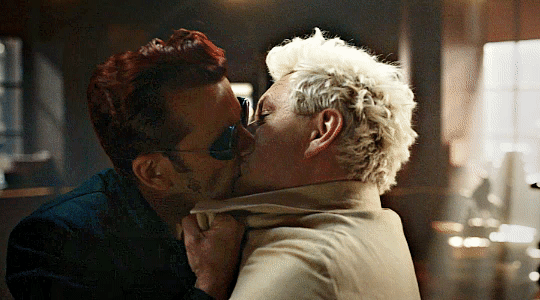
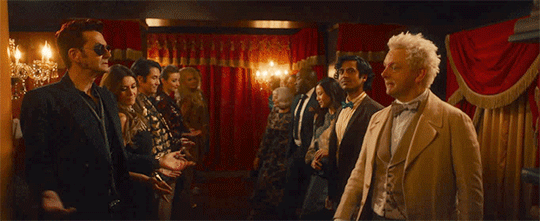
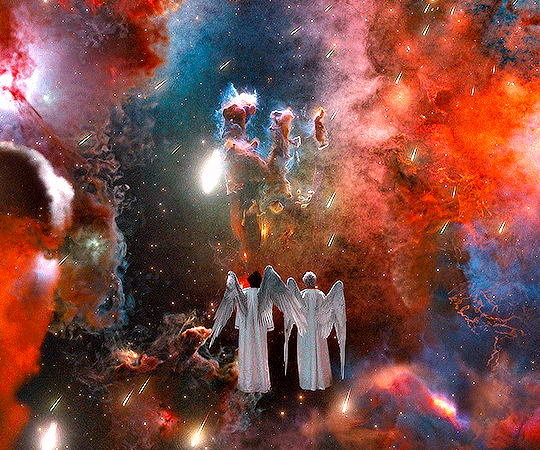
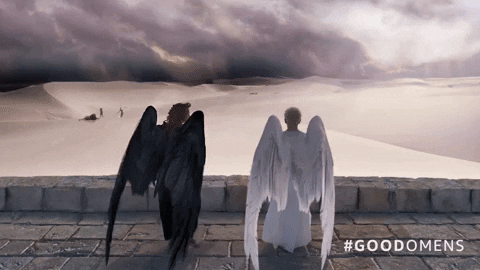



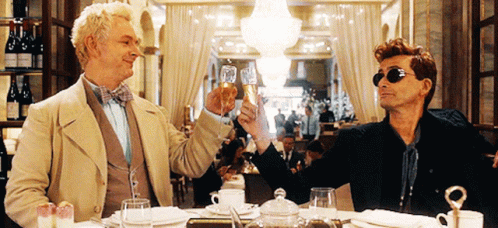
My brain still lives here!!
But Neil has said that Good Omens 3 is not quiet, gentle, or romantic. I imagine it's going to be more like the the first season in which they are not central to the plot. GO2 will help us make sense of how they ended up where they are when we see the bigger picture with all the other major players involved with GO3.
Aziraphale was still a soldier and accidentally got himself discorporated in his own magic circle in season one. He had a platoon waiting on him to start Armageddon, and he deserted them to go save the world with Crowley instead. Aziraphale is a deserter. I need everyone to remember that. He yeeted himself out of Heaven and sought out Crowley before even locating a body just to warn him about what was happening so they could try to save the world together.

I can't help but think of 1941 and that magician who had been arrested for being a deserter.
Aziraphale disobeyed orders. That took courage but it branded him as a traitor against Heaven. They tried to destroy him for it the same way Hell tried to destroy Crowley for his part in stopping the war.
Aziraphale and Job are the only characters we have seen interacting with God directly. Aziraphale has spoken to God before and he is determined to do so again.
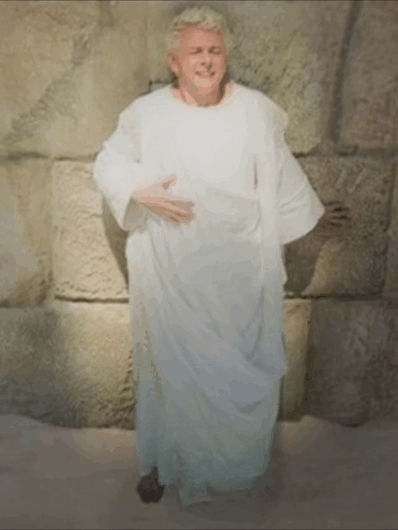
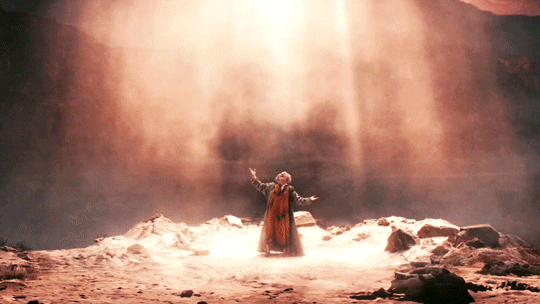
Aziraphale knows Heaven is flawed, but he also knows it's supposed to be good. He wants it to be good. He does not like the way the system works and he wants to make a difference. (And I'm pretty sure he's also determined to talk to God without being intercepted by The Metatron.)
Since when is that a bad thing? I don't get it. And I've had this discussion before.
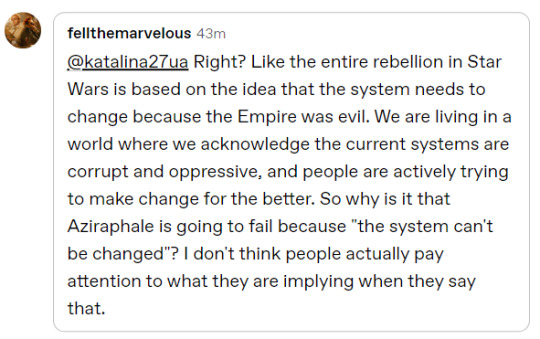
If you need to change the system by burning the old one to the ground, it's still change, and we don't know what Aziraphale has planned.
It seems to me that people just want to see Aziraphale fail because it would punish him for returning to Heaven instead of running off with Crowley.
Some of y'all take everything Aziraphale says or does and twist those things into malicious anti-Crowley actions because you think the only reason Aziraphale exists is to make Crowley happy, and if he isn't thinking only about Crowley then he's doing something wrong.
Aziraphale does not exist as a plot device to further Crowley's character. They come as a pair. They've been learning from each other for 6,000 years. Crowley challenges Aziraphale just as much as Aziraphale challenges him.
You can be mad at Aziraphale all you want, but villainizing him is gross. Defending Crowley does not mean you have to tear down and mischaracterize Aziraphale anymore than defending Aziraphale means you have to tear down Crowley (but I don't see that happen on nearly the same level it happens to Aziraphale). Stop painting Aziraphale as an abusive partner, for fuck sake.
Aziraphale knows there are flaws in the system. He wants to make a difference, and since he has seen that Gabriel can change, then maybe the whole system can. He has to at least try, and if he can succeed then maybe he and Crowley can stop hiding and finally be together without having to look over their shoulders all the time.
Why is that a bad thing? He's just as protective of Crowley as Crowley is of him!

But don't forget that Aziraphale's wing was covering Adam and Eve too. As much as a wants to protect Crowley, he has a moral imperative to keep humanity safe as well.
He sent Adam and Eve into the unknown with a flaming sword so they could protect themselves.
As much as he wants to be with Crowley, there are 8 billion people on Earth heading toward the Second Coming and Judgment Day. They'll work together to fight alongside humanity in the end. Aziraphale should not have to humiliate himself just to earn Crowley's forgiveness. That's a rancid notion.
The Resurrectionist was a whole ass moral dilemma for Aziraphale, which is why I brought up The Good Place earlier, but that's a post for a different time.
Aziraphale has his own motivations and they're just as important as Crowley's, and they don't have to be chalked up to Aziraphale being the bad guy. Weird, I know, but shades of grey.

"To the world."
#good omens#good omens 2#aziraphale#crowley#aziraphale defense squad#yeah i'm being bitchy#no i don't care if you're offended#no i'm not interested in your aziraphale hate#i'm not interested in hearing takes about aziraphale being toxic from people who can't even be objective#some of y'all need to watch the good place because you need a lesson in moral philosophy#we should be able to have discussions about the characters without gross takes calling aziraphale abusive#az and crowley approach everything from wildly different perspectives because of where they are#just admit y'all shit on az because he doesn't look or act like crowley#I'm so done with the shitty aziraphale takes#they aren't even interesting enough to debate#they're just annoying
483 notes
·
View notes
Text
When you (generic, universal) talk about theories about the end of Season 2 and Aziraphale going to Heaven, you often run up against either:
taking everything at face value to the point of ignoring that some details contradict one another
or
accidentally nullifying major emotional, plot, and character beats by implying that they Didn't Really Happen.
A lot of the differences in analyses, especially ones that I like (LOL), can be explained by the fact that we're analyzing a character who is experiencing massive cognitive dissonance and believes a number of contradictory things at once.
Nobody is wrong to point out Aziraphale's need to Belong to a Good Cause, which makes his acceptance of the Supreme Archangel position entirely in-character; nobody is wrong to point out Aziraphale's anxiety around the Metatron, which indicates that he may have been coerced.
Did Aziraphale go back to Heaven because he's afraid of what will happen if he keeps refusing, or because the Metatron made an implicit threat? Did he go back to Heaven because he's vulnerable to flattery and wants to feel important? Did he go back to Heaven because he thought it would be a way to be permanently safe with Crowley? Or did he go back because he missed belonging to something Good, something bigger than himself? All of the above. It's all of them.
Yes, even though it's incredibly dissonant to believe a system that he KNOWS is dangerous and coercive can accomplish true Goodness, that is in fact his belief.
Admittedly, this is no one I follow - just random comments I see around from people I don't know very well - but it seems like some people out there are assuming Aziraphale can't possibly be making any plans to do anything remotely intelligent, because this would mean that he is already aware that Heaven is bad and would therefore leave no room for character growth.
Except no, that's not necessarily what it means. In fact, the cognitive dissonance is the main thing he is going to have to resolve. Having that dissonance - the belief that Heaven's ideals are genuine, along with the understanding that Heaven is dangerous and needs to be carefully manipulated - is what will move his plot forward. Mindless obedience wouldn't progress his story any more than magic brainwashing coffee would, and it would be equally inconsistent with his story and motivations so far.
The dissonance is the point. And part of the dissonance is that he already knows Heaven is dangerous - he just hasn't accepted what that means yet. It would make sense for him to simultaneously try to work within Heaven's system and watch his own back.
Also, only partly related: Neil might write a story about how the worst people exploit the need to belong and to be Good. He might write a story about how we have to become our own greater good. He might write a story about how to rebuild after you discover your greater good is not so great or good after all. He is not going to write a story about how having any faith or trust in something objectively bigger and stronger than yourself makes you a stupid clown who is wrong about literally everything and shouldn't have even tried.
Let Aziraphale fuck up. He needs to and he will. Whatever plans he was making in that elevator won't actually succeed. But give him credit where it's due.
Edited to add: And you know what? When he fucks up, he's going to get through it. And then he's going to do the right thing. And he's going to get it right when it matters the most.
#good omens#good omens 2 spoilers#go s2 spoilers#aziraphale#I am like SO SENSITIVE about Aziraphale because look#during the Final Fifteen he is the one saying the more hurtful things#and he is the one being misled back to an objectively bad place#but he is trying SO SO HARD#and I see myself in how incredibly hard he's trying
755 notes
·
View notes
Text
I'm wondering how much of the fandom reaction of "Aziraphale doesn't ACTUALLY want Crowley to be an angel, he just wants to keep him safe/happy!" is because we spent four years between seasons assuming that Aziraphale had already accepted that Heaven and Hell aren't all that different, and that demons and angels aren't inherently good or bad. And it's difficult to let go of that idea in the same way that it's difficult to let go of the idea that they talked their shit out That Night At Crowley's Flat and have been happy ever since. But to actually understand Aziraphale's choice without hiding it behind coffee or lies or secret plans or body swaps or magic tricks or purely romantic intentions, we have to to understand that Aziraphale is still working under an incorrect framework of the world as divided into Cosmic Good and Cosmic Evil.
Because the thing is. Aziraphale does not like that Crowley is a demon. He just doesn't. We can talk about his reasons, but I really don't think that it's a disputable fact at this point. Aziraphale CONSTANTLY talks down to Crowley about the differences between them, and disparages demons in general and Crowley in particular over and over again. I mean, he's obviously just spewing the party line at this point, but he even describes the ultimate triumph of Heaven over Hell as "rather lovely." To Crowley. Where does he think Crowley fits, in that scenario? Is he thinking about it? (He is, surely, given how distressed he is over the danger Crowley is in due to the Arrangement?)
Crowley, to be fair, often says similar things about himself, and hates when Aziraphale calls him things like 'nice.' But as I've mentioned in another post, I think 2.03 makes it all but canon that a lot of that is self-preservation. Hell can't know that he's running around saving children and rescuing people from suicide and poverty, or he'll get dragged down there for decades. Crowley doesn't really think of himself as evil--he's visibly upset during their argument when Aziraphale hits him with "you're the bad guys!" because he thinks Aziraphale knows him better than that.
But instead, Aziraphale makes knee-jerk assumptions about Crowley and his intentions over and over again, including that he's behind the Reign of Terror in Paris and, about two minutes before realizing he's in love with him, that he's working with Nazis. Crowley seems annoyed and hurt both times, and denies it. There's no demonic posturing from him then.
Which makes the Job ep really interesting, right? Because Crowley actively lies and says that he is doing the properly demonic thing, but Aziraphale doesn't buy it. And why doesn't he buy it?
"I know the angel you were."
To Aziraphale, Crowley's kindness stems from the traces of that angel he knew. He thinks Crowley does good in spite of his nature, and not because of who he is as a person, life experiences as a demon very much included. This is because to Aziraphale, Heaven is Good, and all goodness must stem from it.
I've seen people get accused, when making this point, of attacking Aziraphale, or saying that he doesn't love Crowley, which is a ridiculous takeaway from S2. I've never seen a person more obviously in love, or a person more obviously trying to do good in the world. But so much of Aziraphale is tied up in his ability to believe multiple contradictory things at once. (See: the 80 years between "maybe there is something to be said for shades of gray" and "Heaven is the side of truth, of light, of good.") That doesn't make him stupid or ill-intentioned (in fact, he wouldn't need to do the kind of mental gymnastics we see from him if he wasn't clever enough to see through at least some of the bullshit) but it does mean that he's fully capable of loving Crowley while at the same time believing that demons are 'the bad guys.' Solution? Make Crowley an angel. Fix him, fix the bad apples in Heaven, be happy together, eliminate human suffering. Vavoom. Sorted.
Idk man. I'm constantly seeing takes that just...completely discount that Aziraphale really, genuinely, has misunderstood Crowley and the way the world works in his choice to return to Heaven. We can't blame it all on miscommunication. The most honest conversation in the world wouldn't fix this. Aziraphale has to go up there, without Crowley, and learn for the last time that Heaven is not Good, and will never be Good, because there is no Good. Good doesn't come from Heaven, or God, or even Crowley (and I see y'all, putting Crowley on a pedestal, saying Aziraphale wants to remake Heaven in his image--stop it.) Good comes from making the choice, in a very complicated world, to help as best you can, and it comes from love. And that's what Aziraphale will learn in season 3.
#good omens#good omens meta#good omens season 2#aziraphale#gos2 spoilers#long post#sorry about the paragraphs of meta every couple of days. I'm still unwell about it all.#this will be the last one. maybe. who can say
787 notes
·
View notes
Text
Heaven's Not Homophobic in Good Omens, and Why That's Important
I need to preface this with, I am not trying to start a fight or argument and won't tolerate any homophobic or bad faith arguments in response to this. Cool? Cool.
This is in large part inspired by this ask from Neil's blog, which sparked some discourse that I don't want to get involved in but that brought up some analytic questions for me.
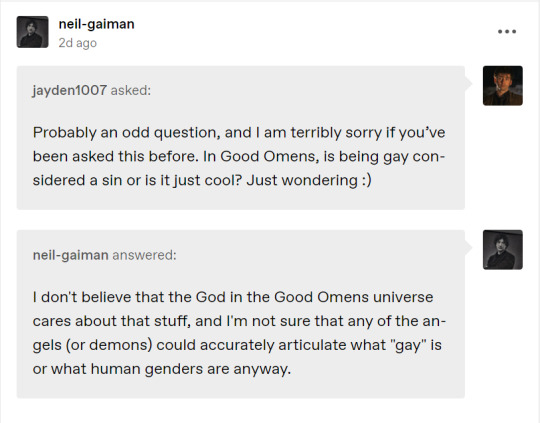
He goes on to reblog a question asking about Uriel's taunt specifically, clarifying that "boyfriend in the dark glasses" can just as easily be read/translated from angelic as girlfriend or bosom buddy. The idea is that an angel and a demon "fraternizing" is seriously looked down upon, not that heaven is homophobic. And that's super important.
We see homophobia in both the book and show, of course. Aziraphale is very queer-coded, intentionally and explicitly so, and we see the reaction of other humans to that several times. Sergeant Shadwell, for example, and the kid in the book that calls him the f-slur when he's doing magic at Warlock's birthday party. These are, however, individual human reactions to his coding as a gay man.
I am, personally, not a fan of heaven redemption theories for the show; no hate for people who want that it's just not something I'm interested in. I don't believe that heaven is good with bad leadership, or that God Herself remains as a paragon of virtue. To me, that's not in line with the themes and messages of the show. It's important, however, that heaven doesn't reflect human vices. Heaven can be nasty and selfish and apathetic in its own right without ableism, homophobia, transphobia, or racism. This matters for two reasons.
Firstly, we don't need the -isms and -phobias to be evil or at least ethically impure. In a world where we spend so much time fighting against prejudice and bigotry, our impulse is to see that reflected in characters whose motivations we distrust or who we're intended to dislike. While it's true that that's often the big bad evil in our daily lives, it can really cheapen the malice in fictional evil from a storytelling standpoint. A villain motivated by racism or as an allegory for homophobia can be incredibly compelling, but not every bad guy can be the physical representation of an -ism. Art reflects the reality in which it's crafted, but the complexity of human nature and the evil it's capable of can't be simplified to a dni list.
Secondly, and I think more importantly, is that for Good Omens specifically, this places the responsibility for homophobia on humanity. If you're in this fandom, there's like a 98% chance you've been hurt by religion in some way. For a lot of us, that includes religious homophobia and hate, so it makes sense to want to project that onto the 'religious' structure of Good Omens. It's a story that is, in many ways, about religious trauma and abuse. However, if heaven itself held homophobic values, it would canonize in-universe the idea that heaven and religion itself are responsible for all humanity's -isms and -phobias and absolve humans of any responsibility. Much like Crowley emphasizes repeatedly that the wicked cruelty he takes responsibility for is entirely human-made, we have to accept that heaven can't take the blame for this. To make heaven, the religious authority, homophobic would simply justify religious bigotry from humans. By taking the blame for religious extremism and hatred away from heaven and the religious structure, Good Omens makes it clear that the nastiness of humanity is uniquely and specially human and forces the individual to take responsibility rather than the system. Hell isn't responsible for the Spanish Inquisition, which by the way was religiously motivated if you didn't know, and heaven isn't responsible for Ronald Reagan.
This idea is perhaps more strongly and explicitly expressed in the Good Omens novel, in the scene where Aziraphale briefly possesses a televangelist on live TV. It's comedic, yes, but also serves to demonstrate that human concepts of the apocalypse and religious fervor are deeply incorrect (in gomens universe canon) and condemn exploitation of faith practices. Pratchett and Gaiman weave a great deal of complexity into the way religion and religious values are portrayed in the book, especially in the emphasis on heaven and hell being essentially the same. They're interested in the concept of what it means to be uniquely and unabashedly human, the good and the bad, and part of that is forcing each individual person to bear the brunt of responsibility for their own actions rather than passing it off onto a greater religious authority.
Additionally, from a fan perspective, there's something refreshing about a very queer story where homophobia isn't the primary (or even a side) conflict. The primary narrative of Good Omens isn't that these two man-shaped-beings are gay, it's that they're an angel and a demon. The tension in their romantic arc arises entirely from the larger conflict of heaven and hell, and things like gender and sexuality don't really matter at all. Yes, homophobia and transphobia are very real, present issues in our everyday lives, but they don't have to be central to every story we tell. There's something really soothing about Crowley and Aziraphale being so queer-coded and so clearly enamored with each other without constantly being bombarded with homophobia and hate. It's incredible to see a disabled angel whose use of a mobility aid makes no difference in their role and to see angels and demons using they/them pronouns without being questioned or misgendered. It's all accepted and normalized, and that's the kind of representation that we as queer people deserve.
#anywho that got real long#good omens#neil gaiman#terry pratchett#media analysis#good omens analysis#queer coding#queer representation#ineffable husbands#gomens#aziraphale x crowley#anywho happy valentines day#love my fandom#not beta read or majorly edited because I'm a busy guy with homework so lmk if there's any errors that need correcting (politely!)
277 notes
·
View notes
Text
I love Aziraphale because he's expected to be hard, to be a warrior, but he chooses to be soft. He's not gentle, kind, and good because he's an angel. We've seen what the other angels are like and many of them are anything but. And there's no doubt that he could be that warrior if he wanted. He was issued a flaming sword, after all. But he gave it away and seemed none to eager to use it when he finally picked it up again. No, he is who he is because he chooses to be that way again and again.
I adore that. In a world that's often so hard and in a system that expects him to be just as hard, he chooses to be soft. To be silly. He learns to dance even though angels don't dance. He learns magic and French the human way. Successful or not, he likes playing parts, living it up as a double agent and newspaperman. He wears glasses because he thinks they're nifty. He enjoys eating food and going to the barber not because he has to but because he likes being pampered. To be fussy and indulgent. Despite strength and miraculous powers, he makes himself vulnerable so that he can be coddled and rescued.
And it's not like it's easy for him. He has to struggle against what's expected of him and against judgment from the other angels. He was worried about doing the wrong thing before the beginning, before there was even really a concept of the wrong thing. He's so terribly anxious but he doesn't let it stop him from trying to do real good. He did his part to save Job's family, even when he was certain he would fall for it.
Most difficult of all, he loves. Is in love. A thing humans do, he says to the Archangels in S2. So that's not just some easy, natural, angelic thing for him. It's very human and very scary because it's not really something he's meant to do and especially not with a demon. But he pushes slowly forward as best he can. He risks small touches and can't help but wear his heart on his sleeve with that all too expressive face. He's the angelic embodiment of heart eyes. Because he wants to love and be loved.
This isn't all he is, of course. He can be bitchy and petty and hard when pushed. He can be the warrior he was built to be. Those aren't bad things. Just enough of a bastard and all that. But just enough also means they also don't define him.
Which is where my frustration comes in. I understand the desire to flip the script sometimes. I like to do it myself from time to time and definitely think Aziraphale should be allowed to take charge. But it feels like, more often than not, large parts of fandom have taken those moments and made them all of who he is. Of the two of them, he's often made to be much more impassive and distant than Crowley. It's Crowley who is more emotional, who is more overcome physically. Despite the fact that it's almost entirely Aziraphale in canon who reaches and touches. Despite Michael Microexpressions Sheen putting so much open heart into Aziaphale's face. He isn't allowed to be soft and needy, comforted, coddled, and rescued. To be the one who yearns and lets himself be weak with it.
Just... let him be soft and silly. Let him be the person he most often chooses to be.
#aziraphale#good omens#long post#gos2#pls I'm old and tired and not trying to pick a fight#just I so often see someone wearing aziraphale's face#and have to say#this is not my beautiful house#this is not my beautiful wife#good omens meta#meta#sort of lol#more a wild ramble
307 notes
·
View notes
Text
What if Aziraphale wasn't on earth between 1941 and 1967?
What if, the same way Crowley was brought back to Hell in 1827 Aziraphale was recalled to Heaven in 1941?
Hear me out: Aziraphale has been making slow but steady progress within his character arc right? In 1941 at the end of the night, sharing drinks with Crowley in the bookshop, Aziraphale was willing to accept that things are not always black and white and sometimes there is room for shades of grey (albeit very light grey). Compare this to his thinking concerning Elspeth. Aziraphale kept flip flopping back and forth over whether Elspeth's actions were good or bad. He didn't seem to consider her actions were ethically complicated. In his mind they could either be good or bad depending on whatever information came to light in the moment.
It also seems that after the church, the magic trick, and the shades of grey discussion, Crowley and Aziraphale are back on good terms with one another. At the very least, talking and willing to spend time together again. Other than the mention of how easily accessible the holy water is in the church, Crowley doesn't seem to mention or allude to his request again. However, in 1967, it feels like their interactions are strained again. Aside from the awkwardness and tension in their conversation, it's also strange that Crowley is surprised to see Aziraphale in the Bentley (despite being PARKED IN FRONT OF THE BOOKSHOP) and that Aziraphale is only aware of what Crowley is up to through second-hand means “I work in Soho, I hear things." (You don't need to 'hear things' when Crowley is conducting those things IN FRONT OF THE BOOKSHOP)
So what happened? My theory: Aziraphale has been serving out a punishment in Heaven since 1941.
Fandom consensus seems to be that there is a 1941 pt. 3 coming next season and many are hoping for a kiss or something undeniably romantic (I am too ngl). But what if it's actually a scene where Aziraphale gets dragged back up to heaven?

Shax said that 80-90 years ago was the first time that she heard about Crowley and Aziraphale being an item. We can assume that this 80-90 years ago was during Furfur’s failed evidence presentation to Dagon and F(r)iends.
A lot of demons were hanging around in that scene. It wouldn’t surprise me if one of them (or Shax herself) got in touch with an angel in Heaven and let them know about the rumor downstairs of Crowley working with an angel on Earth.

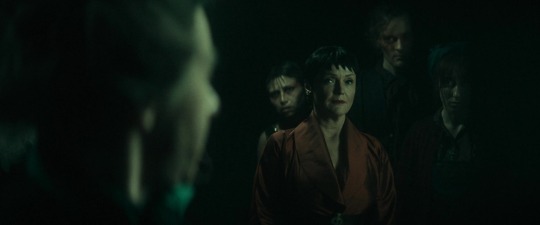
Obviously, Heaven can’t allow that, and who else could it be other than Aziraphale? He’s the only angel down there, so they recall him. Without evidence though, and given that (1) it's a demon's word against an angel's; (2) less than a century and a half ago, Gabriel awarded Aziraphale a medal for his work on earth (bookstore opening cut scene); and (3) as far as we know, Aziraphale hasn’t had any major offenses other than frivolous use of miracles, I don’t think Heaven can really do much. That doesn’t mean they don’t do anything, I just don’t think they do anything like use hellfire on him or make him fall.
Despite the lack of evidence, Heaven still has to make an example out of Aziraphale for getting caught working with a demon. I think whatever punishment Heaven doles out, keeps Aziraphale up in Heaven for a long time.
(Small tangent: If it can be traced back to one event rather than a slow progression over millenia, this rumor is also probably what makes all the archangels be so cruel to Aziraphale (or at least finally gives them permission to act on what they’ve been wanting to do for ages). Maybe this is when they start looking into Aziraphale’s past endeavors and notice Crowley everywhere.)
It could be worse, if there had been evidence, it would have been worse. Still (Aziraphale might think), this is Heaven, 'the side of good', they wouldn't take it too far. He probably received a trial before his punishment began. And yeah the trial is more for show than anything else, but it's not like Hell would have bothered with any of that. Hell would probably delve right into whatever torture they'd decided for punishment. His time spent in Heaven, no matter how intense the punishment, would have been a breeze to tolerate compared to what Hell would do to Crowley. Speaking of which...
By the time Heaven lets Aziraphale back down to Earth, I think he would be a mess of mindless worry. He had just come to terms with his feelings for Crowley after all. Maybe this is why Aziraphale decides to give Crowley the holy water after all. He's had more than enough time in Heaven to realize that as much as he wants to protect Crowley and keep him safe, all that intent means nothing if he's stuck in Heaven because of his own carelessness. In Aziraphale's absence (or destruction), holy water could keep Crowley safe, at least from Hell, even if it is dangerous. Once Aziraphale is back on Earth, when he hears what Crowley was plotting, it probably further cements his decision to give it to him.
If Aziraphale got taken up to Heaven right after the magic show, he probably has no idea if his palming of the polaroid worked for sure. The bookshop is a safe place for Crowley to be away from Hell, but how long will that last? Is it still an embassy with Aziraphale up here in heaven? Is Crowley defenseless against the other demons down there? Did Hell come for Crowley after all even without evidence?
So how long is Aziraphale gone for? We already know that after Crowley got sent back to hell in 1827 and Aziraphale didn’t see him again for “a very long time.” The next meeting we, as an audience, see between them is the holy water request in 1862. So at worst, Crowley's been in Hell for ~30 years. Heaven probably would have taken Aziraphale back for a similar amount of time. And wow look at that, 26 years ago by between 1941 and 1967.
There’s enough ambiguity in the set and dialogue to allow for this length of absence as well. I already wrote a post about how ridiculous Aziraphale is for saying 'I work in Soho I hear things' in 1967 when the whole scene takes place outside the bookshop and how equally ridiculous Crowley is for seeming to think Aziraphale wouldn't notice him prancing around the block plotting to steal from a church. But maybe Crowley conducting his holy water heist business all over Aziraphale's corner of Soho is because as far as he knows Aziraphale isn't around anymore. In my post, I point out that the bookshop is blocked off by the "Striptease" and "Love Shop Cinema" signs but that you can tell it’s the bookshop because of its pillars.
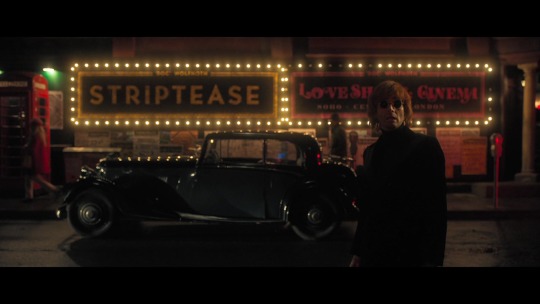
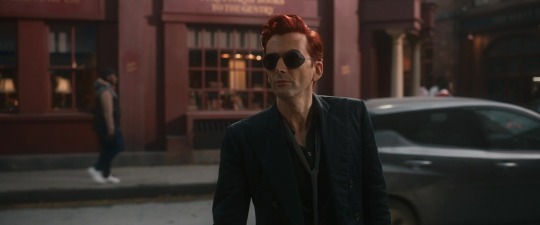
I admitted that it was weird to cover up half the windows, but didn't really have any diegetic explanation for it. Maybe the explanation is that Aziraphale’s bookshop has been abandoned for years. In which case, I think Crowley might be hanging around Soho caring for it and the books, making sure it doesn't get vandalized, protecting it from snooping humans, etc. (tangent: this could also be why Aziraphale says that the bookshop is both of theirs. Maybe the "plenty of use" he said Crowley got out of it was while Aziraphale was away. Maybe Crowley used it as a pseudo base of operations.)
Aziraphale being gone would also explain why, suddenly, 105 years after his initial request, Crowley is plotting to steal holy water from a church. Aziraphale has been gone a long enough time that Crowley is starting to get antsy. Maybe he’s starting to think that Aziraphale is gone for good (not dead, he is an OPTIMIST DAMMIT). I think Crowley is spurred to start the holy water heist because he thinks Aziraphale isn’t going to be assigned to earth any more and whoever they're sending down next is going to be more of a smitey kind of angel. And if Aziraphale isn’t around anymore, then the demon-proof-except-for-Crowley-bookshop/embassy is also likely not going to stop any demons from getting to Crowley whenever they want. If Aziraphale is really not coming back, then Crowley is alone again, on his own side, for the first time since they saved Job's kids. He's gonna really need that insurance now more than ever and unfortunately, he has no one else to rely on. He’s gonna have to procure it himself, even if it’s dangerous and dumb.
Aziraphale's absence (as much as I am loathe to let go of the theory that Aziraphale and Crowley are just being incredibly dramatic idiots) can also explain some of the dialogue from the 1967 scene.
“What are you doing here?” might seem a silly thing to say when Crowley is parked outside of the bookshop, but makes sense if he's reacting to seeing Aziraphale for the first time in years, so damn close it can’t be a dream, right inside the Bentley.
“I work in Soho, I hear things,” is not just a way to give the audience exposition that Crowley wouldn’t need but a way for Aziraphale to explain why he’s there.
The barely concealed desperation in Crowley's voice when wanting to give Aziraphale a lift home (despite being LITERALLY OUTSIDE THE BOOKSHOP), or to take him anywhere he wants, makes a little more sense if he hasn’t seen him in years, wants to catch up, and doesn’t even know where Aziraphale would be staying if not the bookshop.
If this theory is true and Aziraphale has been absent between 1941 and 1967, it could explain why we don't see the bookshop in the 1967 scene even though everything else in the scene points to it taking place on that corner, it would give Aziraphale a reason for deciding to give Crowley the holy water after all even though hes been stubbornly opposed to it for more than a century, and it could also explain why even though he was making a lot of progress character wise to, it felt like he was regressing again.
#good omens#good omens 2#go2#gos2#good omens meta#good omens 2 spoilers#long post#i would love to hear what you all think about this#im sure im missing stuff that this theory cant explain within the show#but it feels pretty solid to me
189 notes
·
View notes
Text
A theory about Aziraphale, Crowley, Mrs. Cheng, and high sensitivity
What's up with Aziraphale sensing love in Tadfield and thinking Maggie might be able to hear Heavenly trumpets and with Mrs. Cheng pausing weirdly at the bookshop door before entering The Ball?

What if bad spelling isn't demonic and sensing love isn't angelic? What if Aziraphale (an angel), Crowley (a demon), and Mrs. Cheng (a human) all actually just have the same ability? What if they are all HSPs-- highly sensitive people?
Aziraphale's ability to sense love is something that has spanned both seasons now and I know some people think this is an angelic thing but there's evidence, imo, that it's not. The show has been putting forth a message that angels, demons, and humans are really not that dissimilar. They have different life spans and abilities but they're all under the same kind of umbrella and none are superior or inferior to the other. They suggest this with the symbolism of labeling all of them all as insects (humans are ants, angels are bees, demons are hornets, flies are Beez's department) and as different kinds of waterfowl. Pat's example magic trick of The Professor's Nightmare-- the rope trick-- during The Blitz, Part 2 is also this as well. You have three different ropes that seem like they're different lengths: the big one (angels), the medium one (demons), and the small one (humans) but if you put them all together under the same light and you pull (like the force of gravity, that Gabriel and Crowley talk about in S2), you see them as all the same length.
The idea then is that angels and demons are just like humans, in terms of their needs and wants, and some don't recognize it because their supernatural abilities inhibit their ability to consider why they might also have human corporations in the first place. All of the angels and demons really need to eat and sleep and to not feel alone. Some of them, like some humans, might be interested in romantic love and/or sex, and some of them, like some humans, might not be. Things the show has coded as "demonic" at times-- like being terrible with language-- they also quietly illustrate as not being fully true. It can't be that all demons are terrible spellers who aren't great with words because Crowley is a demon and a literal poet while Gabriel was the Supreme Archangel of Heaven-- and he once suggested that keeping the status quo would keep things "static and, uh, quo-y." Who is better with words: Lord Beezlebub or Sandalphon? Beez, by a long mile, right? But Michael is also better with language than Hastur. The point is that it doesn't matter if you're an angel or a demon or a human-- some people are good with language and some are better with other things.
So, just some of the demons are bad spellers-- which doesn't actually mean anything. There are plenty of terrible spellers who are very intelligent and who are just better at different things-- which is something that is true of humans as well, right? What if we apply those same ideas to the sensitivity thing?
For one thing, if all angels-- or, even, just a lot of angels-- had a high sensitivity to love like Aziraphale does, the end group scene in S2 should have gone differently. The only angels experiencing or sensing love in the bookshop during the Ineffable Bureaucracy scene are Gabriel (who is the one feeling it) and Aziraphale. Being in the presence of love did nothing for Michael, Uriel, Saraqael or even our sweetheart Muriel (who, to be fair, wisely had their nose in a book in the back of the room the whole time but still probably should have been able to sense something if that's actually an angelic power.) The only angel actually overwhelmed by the love in the room is Aziraphale... which is, mathematically, kind of interesting. Aziraphale is one-sixth of the angels in the bookshop in that moment, which equates out to the roughly 17% percent of the human population estimated to be HSPs, or highly sensitive people, some of whom are also empaths.
If you go back to S1, when Aziraphale and Crowley enter Tadfield and Aziraphale starts experiencing love, he says to Crowley: "I'm astonished that you can't feel it." This comment alone might be suggested to say that the high sensitivity that Aziraphale has is something that isn't an angelic ability. By saying he's surprised that Crowley can't feel it, Aziraphale is saying that he knows that Crowley is sensitive in the same way that Aziraphale is. Crowley, too, is then what humans would probably call a HSP. Crowley balks at the suggestion in S1 but we can see in S2 that it's true when Crowley has his version of being overwhelmed sensing emotion and, in his case in that moment, it was waves of distress. Who else experiences it at the same time as Crowley does? A human. Mrs. Cheng.
Mrs. Cheng is the only other character who gets the heebie jeebies during the arrivals at The Ball. Both she and Crowley actually experience it before the demons come up Whickber Street, around the same time. Crowley attributes it to the demons and his own anxiety over Hell circling closer to the shop while Mrs. Cheng gets pulled into Aziraphale's magic and forgets what she felt at the door. Why did Mrs. Cheng feel something when others who came to the door did not? Because she's a highly-sensitive person.
Aziraphale is an angel, Crowley is a demon and Mrs. Cheng is a human. They are all highly-sensitive people. They all have the same high level of sensitivity.
Maggie shown to be a bad speller? Maybe she's just a human who can't spell, like many humans and demons (and angels) are. Why does Aziraphale think she could hear the Heavenly trumpets sounding the arrival of angels? It could just be because Maggie runs a music shop. Maggie is a musically-sensitive human. Aziraphale thought that might make it possible that, if anyone could hear the trumpets, it might be Maggie. He's not really sure how this all works. Aziraphale thinks that if he can feel love between humans then maybe humans that know music well might be able to hear Heavenly trumpets.
Back in S1, we see in a couple of scenes that Adam has what Crowley calls "an automatic defense thing-y" that keeps him from being found-- and seen, to an extent. A shield of sorts keeps Anathema from reading Adam's aura, showing that such a thing is in place and intact. Because Adam is the antichrist, his power overrides the other demons shy of Satan, so the presumption could be made that those of us who think that the reason why it's when they cross into Tadfield that Aziraphale begins to feel overwhelmed by love is because Adam's shield overrode Crowley's own "automatic defense thing-y" are correct because, let's be real, Crowley with his sunglasses and his Bentley has never met a defense thing-y he's never given a whirl. It fails when they cross the Tadfield line and Aziraphale is then feeling Crowley's love for him.
This is also why Aziraphale is overwhelmed by it again at Tadfield Manor. At the moment that he has to stop walking, Crowley is looking up at the place and, inevitably, remembering dropping the antichrist baby off there eleven years earlier and how he was supposed to be with Aziraphale that night instead. He's thinking about his own love for Aziraphale and Aziraphale senses it and has to stop walking for a moment, overwhelmed. Adam does love Tadfield but Aziraphale is not sensing his love for his hometown. Adam wouldn't remember being born in a religious hospital that has now become a corporate bonding retreat and wouldn't feel an overwhelming love for the place that he's probably never actually been inside since he left it as a baby. Aziraphale is sensing Crowley, who has probably had an automatic defense thing-y up for most of the time for millennia because, otherwise, Aziraphale would be in a constant state of near-faint.
Maggie may or may not be more than we think she is. She might wind up yet being some kind of supernatural being but she also might just be a human who is a bad speller and can't hear Heavenly trumpets. Mrs. Cheng may or may not be a mysterious figure with more going on than we think but she also might just be a highly-sensitive human who helps to illustrate a commonality between angels, demons and humans by having the same ability to deeply sense emotion that Crowley and Aziraphale do.
#ineffable husbands#good omens#crowley#aziraphale#good omens 2#good omens meta#aziracrow#good omens s2#good omens theory#mrs cheng#maggie good omens
153 notes
·
View notes
Text
Things in Good Omens 2 I still find weird after maaaaany rewatches
Yep, brace yourselves, it's exactly what's in the title:
Maggie making the spelling mistake ("urgrency") in one of the very first scenes of S2.
It is in the very first scene set in the present day. It is the first time we are presented to Maggie. And the spelling mistakes being very much connected to demons all through the season (specially in The Ball episode, with the note about the "angles" and Shax spelling "T-O-S-T-E", not to mention Furfur mispelling Aziraphale's name in 1941).
It is stands out so much because Maggie's mispelling is never brought up again, but the demons' is. And again, it was the audience's first contact with Maggie (even if she is offscreen). It might be just a callback joke (which does not make much sense to me, to be honest), it might be just red herring, or it might be to reinforce the "Maggie is a mirror to Crowley" theory (which does not make much sense to me either, because while Crowley is/was demon, we never see him making spelling mistakes himself).
I'm honestly at loss about what was the intention here. Seens to specific to be just random, given the demons do it many times. My best guess is that it is pure and intentional red herring, to mess with us. But then again, what for?
Miss Cheng (specially in E5S2, "The Ball")
Since my first watch, the brief scene when Miss Cheng is entering the Bookshop for Aziraphale's thinly disguised excuse to have a Jane Austen ball, she has a very... particular look in her face. It is when the weather is getting darkier e gloomier, resembling Michael Jackson's "Thriller" videoclip, because Shax and her "legion" of demons are arriving. The thing is, Miss Cheng does not look afraid at all, or even like she is suspecting something is going on. Miss Cheng looks suspicious herself! I feel like this scene is off in so many levels. First of all, it did not need to be included at all. So why add this scene to the final cut? Miss Cheng does not have a very clear role in the narrative, while all the other shopkeepers have at least something that not only sets them apart from everyone else, but adds something to the narrative and/or callbacks something else in the series.
Beside the obvious Nina and Maggie, Ms Sandwich brings to the table the comical relief, Mr Brown is there to set the excuse for the Jane Austen ball, Mr Arnold provides the fancy classical music for the ball AND the Doctor Who jokes, Justine is an excuse to bring up Aziraphale's bad French again, and give us a callback to the Bastille scene in S1, and Mutt is a callback to the magic shop shown in the zombie minisode.
But Miss Cheng on the other hand brings none of those things. We don't even get to see what is her bussiness. Of course, her scene discussing Ms Sandwich's work is a delight, but honestly, it could have been any other character asking about Ms Sandwich's job. And opportunity to have Ms Sandwich ask what Miss Cheng's work was there, but it was not taken.
Now, the only other scene Miss Cheng is in focus is in the very end of E6S2, when Maggie and Nina decide to sit down with Crowley to have The Talk. Nina asks Miss Cheng to look after the coffeeshop for a few minutes. Again, seens kinda random to have Miss Cheng there, and I really think this specific scene, by itself, might not have any further meaning. But when viewed along her other scenes (and specific lack of better fleshing out, which was given to all other shopkeepers), it just seens weird. Again, might just be a red herring to mess with us, but Miss Cheng is presented in a very sus way.
Aziraphale not having a replacement
Odd phrasing, I know, but I could not find better words to describe it. We are presented very early on to Shax, who is replacing Crowley in his former job in Hell. Shax is an important character all through the season, yet we never get a hint at who is replacing Aziraphale's job vacancy. We don't even get a hint if there is a replacement, or if it was decided Heaven would not be replacing him. We just get radio silence about who is Heaven's representative in London now, or if something happed to that position and why. Maybe if Shax simply did not exist, it wouldn't have bothered me. But since she does, and it is made clear many times that she has Crowley's former job, it stands out to me that nothing is ever said or even alluded about Aziraphale's former job position.
There are some other things that stand out to me, but these are the more obvious ones to me. I would be delighted to hear other people's takes on these matters, as I might have missed something. Oh well, I guess here is my first piece of Good Omens meta.
324 notes
·
View notes
Text
Aziraphale hate makes my brain hurt.
Like let's be really fuckin' for real here.
Neurodivergent fans have repeatedly said that Aziraphale is autistic coded. I agree with them. I have never been diagnosed but I wonder about myself. If only I could get a doctor to take me seriously enough to test me for it, but alas, I'm a 43-year-old woman living in the good ole US of A.
Those with religious trauma have repeatedly said that they identify with him as well. I'm one of those people. I endured 12 years of Catholic schools and just as much time being taught a very black and white view of things that I've had to spend more than 20 goddamn fucking years working to unlearn.
I find that my views as a survivor of religious abuse are often dismissed because people keep wanting to say "Aziraphale doesn't have religious trauma." Yes, thank you, I get that, but unless you've been indoctrinated and brainwashed into a very black and white view of the world, you probably don't understand the kind of feelings Aziraphale's onscreen experiences evoke in so many of us. Heaven might not be real, but the feelings of "God is always watching" still stick with me today even though I no longer believe in God. I have entirely denounced Christianity because of my own personal experience, and I refuse to allow people to try and guilt me or shame me for trauma that I didn't ask for. I wasn't given a choice.
As a child I was told that God was real and always watching everything you do (just like Santa Claus) and can hear everything you say and knows everything you are thinking. Do you know what I learned to do in order to cope with this overwhelming and anxiety-inducing information as a small child? I learned to censor my thoughts. I never spoke up, and I have always felt like I was putting on a show for people because I had to be who I was told to be or I would get into trouble.
Aziraphale said "poverty is a virtue" during The Resurrectionists, and as someone who grew up in the Bible belt and went to private schools, I was taught this very same shit by the Catholic church. He learned in that very same episode that "poverty is a virtue" is actually a tool of oppression to keep the poor poor and the wealthy wealthy. I know we all watched the episode. He went into that episode believing what he said, but by the end of it he knew it was actually utter bullshit. Aziraphale is not ignorant. He's highly intelligent, and he has never been too proud to admit when he has been wrong. He accepts that the information he learned before is not matching up with reality.
And it's so obvious some of you have zero experience with that type of indoctrination because of how very little empathy you show Aziraphale for his "mistake" of "choosing Heaven over Crowley" and "making Crowley sad" so clearly Aziraphale must somehow be "abusive" and "manipulative" and "selfish" and "self-centered" because he didn't choose to run away with Crowley at the end of season two.
First of all.
FIRST OF ALL...
Aziraphale has a mind of his own.
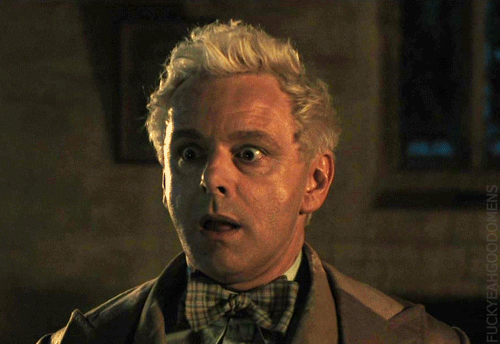
Aziraphale is always going to try and do what is right.
Aziraphale is an angel. He's a being of love. And the reason he's so "bad" at being an angel is because he actually wants to protect humanity. He has always loved humanity. He repeatedly has to contend with what is "right" versus what is "good" and "wrong" versus "evil". Yeah, he has flaws. He's an angel, not a goddamn fucking saint. He has lived on Earth for more than 6,000 years. He has seen everything. He loves doing human things.
He's obsessed with magic. It makes him so happy. He's not very good at it...well not when he's trying to put on a show for Crowley.
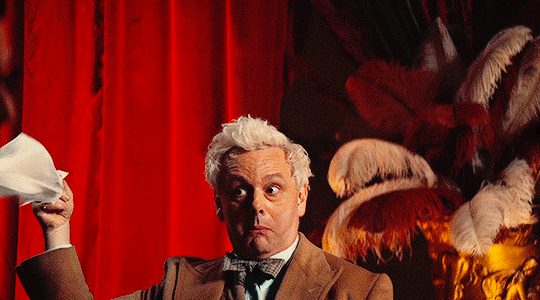
He chose to learn French the hard way, so even though he knows every single language in the world, he chooses to be mediocre at French. Something that annoys and amuses Crowley at the same time.
He loves to dance even though angels aren't supposed to dance, and dancing with Crowley was what he wanted the most.
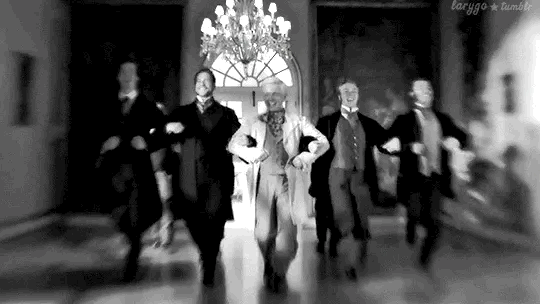
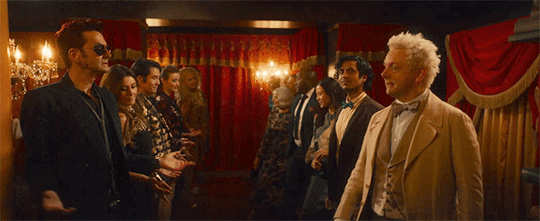
He owns a bookshop and refuses to sell any of his books because they are books he's had for as long as there have been books. He will chase customers away from his collection, and Crowley understands how much they mean to Aziraphale because he refuses to sell any when Aziraphale leaves him in charge.
He and Crowley have been speaking to each other in coded language for more than 6,000 years. They have to be very careful about what they say because Heaven and Hell are always watching.
Heaven has photographs of Crowley and Aziraphale sitting or standing together throughout history. Hell had one photo of Crowley and Aziraphale actually working together and it was Aziraphale's quick thinking and how good he actually is at sleight of hand tricks that managed to get that photo out of Furfur's hands so he wouldn't be able to turn Crowley over to the Dark Council.
Aziraphale saved Crowley from being taken to Hell again. He wasn't able to save Crowley from Hell in Edinburgh, but he sure as heck managed to save Crowley from Hell during WWII. He took Crowley to his bookshop and showed Crowley that he stole the picture from Furfur. He saved Crowley.
You get that, right?
Aziraphale SAVED Crowley.
People always talk about how it's "always Crowley saving Aziraphale" because apparently heroic acts are only heroic when they are grand gestures. The sleight of hand wasn't heroic at all, am I right? It wasn't sparkly and showy. It wasn't interesting enough, therefore not heroic. At least that's all I'm hearing when people start with their "blah Aziraphale deserves to suffer because I have no imagination or ability to understand the media in front of me blah", and all these reasons he deserves to suffer is because Crowley almost got hurt.
Aziraphale did that without flinching and I watch that part closely every single time. He's not scared for himself. He's scared for Crowley, and he managed to hold onto that photograph. He did not fail Crowley. He protected Crowley.
And so here's another thing that we like to point out. The way that Aziraphale, an angel who is effeminate and male presenting, an angel who is soft and full of love, an angel who is kind and forgiving because he has empathy and compassion, is somehow painted as abusive and manipulative. He's not violent, but he could easily fuck up your world. He doesn't use his powers. We have no idea how powerful he is because we only ever see him do small acts. He's used to hiding. It's the only way he has ever been able to protect Crowley.
And I'm not saying that Aziraphale has actually saved Crowley before means that Crowley hasn't also saved Aziraphale. Like, you get that those are not mutually exclusive and their relationship is not transactional, right? They have spent their entire existence protecting each other but never actually getting to be together because Heaven and Hell are always watching.
Yeah, Crowley fell. We all know this. We are aware of this. He was the serpent of Eden. He gave humanity the knowledge of free will.
But what we don't talk about is what Aziraphale gave humanity.
What did he give them?
We all know what it is!
Let's say it together!
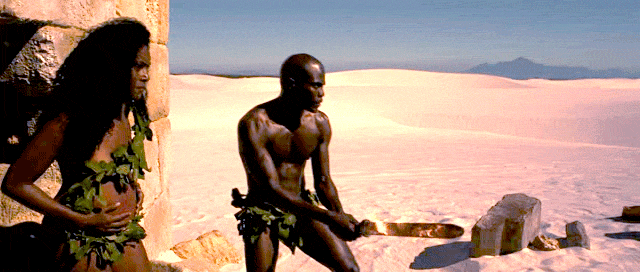
He gave Adam and Eve his flaming sword because it was dangerous outside the garden and Eve was pregnant and she was already having a really bad day. He showed them compassion and gave them his extremely powerful angelic weapon so they would stand a chance on the outside of the garden. He gave humanity the gift of compassion. It's just unfortunate that his flaming sword became a weapon of War.
And then what did he do after that?
Ooooh, yeah, that's right.
God asked him about it and he straight up lied to her and pretended he had no idea where he'd managed to misplace it. She didn't say anything after that. He told Crowley the truth though. He told Crowley the truth even though Crowley fell.
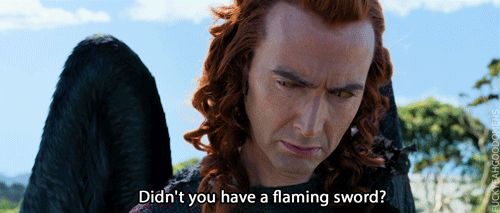
Yeah, we know Aziraphale has done some really fucking questionable things. He and Crowley both suck at passing for human in front of observant people like Nina. They're not human. They are still learning, but they managed to experience human history together despite being on opposite sides and their experiences with humanity are what has shaped them into the compassionate and loving duo they are now. One of them is not better from the other.
This, my friends, is what we call meeting in the middle. It's why shades of gray is so important. Aziraphale constantly breaks the rules. Crowley refused to play by Heaven's rules. It's the reason he fell. He doesn't play by Hell's rules either. These two dorks figured out how to cancel each others' miracles out throughout human history in order to have more time learning about humanity and each other because working all day every day sucks when there are so many new things to learn and experience with the people you love.
We know Crowley and Aziraphale both love each other. Neither of them are good at hiding the hearts stars in their eyes.
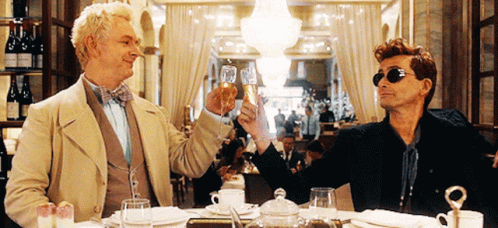
But here's what's really fucking annoying about the Aziraphale hate.
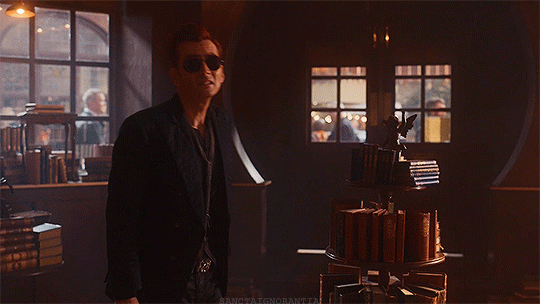
Aziraphale was already crying when Crowley grabbed him and kissed him. Aziraphale is trying so very hard to do the right thing. He loves Crowley. He does. But he also has a duty to humanity, and he has taken that job very seriously since the creation of Adam and Eve. He sent them out into the world with a flaming sword so they would have a chance at surviving beyond the walls of the garden.
And he knows that Something Terrible is going to happen and he spent all of second season trying to figure out what that Something Terrible was while trying to have some sort of more honest and open relationship with Crowley, but again, they aren't human, they are a demon and an angel approaching life from opposite sides who met in the middle and fell in love with humanity together.
He wants more than anything to tell Crowley how he feels about him, but he wants to do something grand for Crowley because Crowley has always been grand and dramatic and sexy and a little bit scary.
Crowley is impulsive and has a temper and sometimes says the wrong thing but he has always trusted Aziraphale because Aziraphale gave him a chance even after he fell. Aziraphale chose to shelter him instead of smiting him while they stood on top of that wall. He knew he was supposed to kill Crowley, but oops, he gave his sword away to the humans so he didn't really have anything to kill him with and Crowley is the one who created nebulas. The Pillars of Creation is Crowley's work and Aziraphale was there to witness that, but he watched Crowley more than he watched the nebula. He witnessed the pure joy on Crowley's face when he said "let there be light" as a nebula full of colors exploded before their eyes. He was fascinated by Crowley.
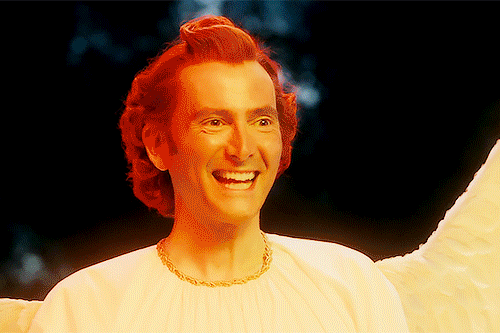
But Aziraphale is going back to Heaven even though he has made it perfectly clear he absolutely has no desire to go back to Heaven. He told the Metatron this during their conversation. He spoke these words out loud. They exist.
But then The Metatron said this....
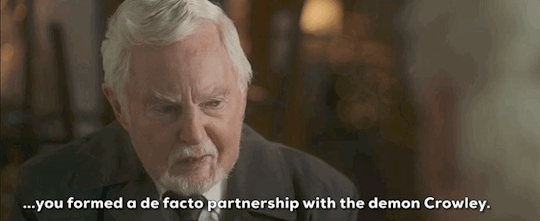
The Metatron. The very same angel who told Aziraphale in season one "to speak to me is to speak to the Almighty." He's the boss. He's the big guy. He's used to existing as a giant head and he had to give himself a body so he wouldn't stand out on Earth. And he knows that Aziraphale and Crowley have been working together since the beginning. He knows they worked together to prevent Armageddon in season one, and now he's made it clear he knows they were working together long before that. And let's face it, Aziraphale really wants to know what this Something Terrible is that Gabriel is running from so he can try to prevent it from happening.
It makes sense that he would want to take Crowley to Heaven with him because he would be able to keep Hell from getting their hands on him again. Aziraphale hates it in Heaven. He doesn't want to go, but Something Terrible is happening and Metatron isn't taking no for an answer, and maybe Heaven won't be so bad if Crowley is there with him. At least they can fix Heaven together.
But Crowley can't go back. We all get that. We don't blame him for saying no. It doesn't change anything.
Something Terrible is about to happen and Aziraphale has to figure out what it is. He wants to change Heaven.
He is fully aware that Heaven sucks. He still has faith in God. His faith isn't in Heaven. He deserted his platoon in season one and threw himself back to Earth so he could figure out how to make sure the war between Heaven and Hell doesn't happen.
But see, here's the thing. Heaven is at the top. Heaven has all the resources. Heaven is responsible for the creation of Hell. Heaven is empty and Hell is overpopulated. Aziraphale knows this. Crowley knows this. It's obvious every time we see either place. Both sides are desperate to go to war and will not hesitate to destroy humanity in the process. This is the opposite of what Crowley and Aziraphale want for humanity. If anyone can change Heaven, it's Aziraphale. He's the only one up there who gives a shit about humanity as far as we know. No one else is going to speak on humanity's behalf.
Some of us are so busy getting mad at Aziraphale for going back to Heaven and giving Crowley a Big Sad. Newsflash: Crowley is not the main character of Good Omens. Aziraphale and Crowley are equals, yet we wanna hold Aziraphale to higher standards because he's an angel, and when he makes mistakes it's proof that he's the bad guy.
Holy mother of all things that trigger my religious trauma, let me tell you. I spent my entire life hating myself every time I made mistakes. I've had to teach myself that just because I mess up sometimes doesn't mean I'm bad. It means I'm human. I still struggle with it. I probably always will. So when you say that Aziraphale deserves to be punished for breaking Crowley's heart, you not only ignore that Aziraphale's heart is also broken, you're saying he deserves to be punished for doing what he thinks is right.
Wanting to change Heaven for the better is not a bad thing.
And some of y'all wanna see him suffer for going back into the lion's den that is Heaven, knowing that he is already an outcast, that they have already tried to kill him once, knowing that he is a deserter, that he has been lying to Heaven about a lot of things, and you still think he's blinded by Heaven? You think he's just so naive and that's the only reason he's going back. He doesn't show his emotions the same way Crowley does so it means he doesn't care as much. He's expected to consider Crowley's feelings over his own when making choices. Like holy shit if all of that hasn't defined my experience as a woman with religious trauma in this fucking society. He's expected to be subservient to Crowley and if he doesn't do what Crowley wants then he's being unreasonable and illogical.
What the actual fuck, y'all.
Like seriously.
I'm sick of this bullshit. I had to step away from this fandom because of how toxic some people in this fandom are. It's not chasing me away, but the fact that I chose to hang out in a a more toxic fandom that is already notorious for being really toxic over a fandom that claims to be more open-minded and welcoming should probably tell you something.
It gave me a lot of perspective, and yeah, I'm still gonna speak up against the bullshit Aziraphale hate.
People are entitled to their opinions, but the Aziraphale hate isn't an opinion. It's just ableist, misogynistic garbage. At this point we all know y'all say these extreme things about Aziraphale because y'all get more joy out of the harm and alienation it is causing others.
Keep being loudly wrong, but if you think I'm not entitled to challenge shitty-ass, harmful, hateful discourse, bite my ass.
I'm not the one who lost the plot in this fandom.
#autistic coded character#religious trauma#good omens#aziraphale#aziraphale defense squad#i'm in a mood#like i'm begging y'all to learn what empathy is#like goddamn i know i'm not perfect but at least i don't forget that the reason for everything in good omens is love#neil has said this several times#it's one thing to dislike a character#it's another to assassinate characters in ways that blatantly contradict what the narrative has told us#and try to pass it off as canon#if you wanna send me hate just hit the block button instead#i'll try to be really sad about it#and if you just have to send me hatemail at least have the courage to attach it to your name instead of hiding behind anon#i'm too old for this shit#i'm gonna go back to the star wars tag now#it's been a minute since i went off and today proved to be the perfect day for it
229 notes
·
View notes
Note
Hello!! I hope you don’t mind me asking but could you do a fluffy Crowley x Demon!reader x Aziraphale fic (or headcanons)??
Maybe something like what it’s like all being in a relationship together?
(Also if it’s not too much to ask can the reader use a cane to walk around? Maybe because of something relating to when they fell and became a demon? If not that’s okay!!!)
First of all, I love you and I could kiss you in the mouth right now. I’VE BEEN SAYING FOR AGES THAT CROWLEY WOULD HAVE CHRONIC PAIN BC OF THE FUCKING FALL. I refuse to believe for one moment that you can fall all the way from Heaven, land on the ground and be all “hey guys i’m fine!”
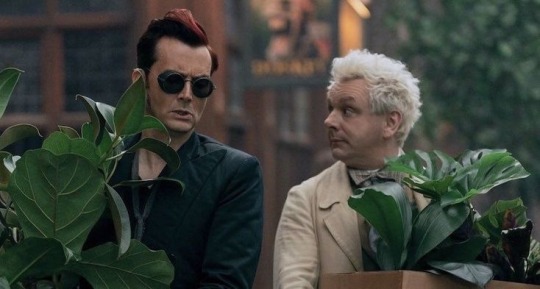
Aziraphale x Demon!Reader x Crowley
Please like and reblog<3
Warnings: chronic pain, but nothing else, this is just good old fluff
• You were an archangel along with Crowley, with the same obligations in making the cosmos✨ so you both met Aziraphale at the same time
• When Azi told you both that the project was destined to close in a few thousand years, you were the one that proposed to fill a complain to God (and crowley seconded you)
• Cue a war and a Fall later, Crowley and you are in Hell, but in different departments so you don’t see each other much
• In fact, you didn’t see Azi and Crowley for the first time since the Fall until the crucifixion of Jesus
• You stood beside them in silent reverence to this poor soul lost for all of humanity
• “What sort of mother would wish this fate upon her own kin?” Crowley and Azi turned to you with confused expressions (although Crowley gained a lot of respect for that comment hehe)
• After some idle conversation, and Crowley convincing Aziraphale not to just smite you right there and then, you three decide to traverse the world
• Centuries pass, and Crowley and you stay around humans (you love their way of living, and he likes children so everyone wins)
• You like to read everything you can get your hands on, to Crowley’s chagrin
• “Now I have two bookworms. What have I done to deserve this?”
• It’s circa the year 1000, in the new continent that these curious people called Vikings have discovered, when Crowley and you decide to experiment a human thing that you had wanted to try for a long time
• Your first kiss is messy, and there are more teeth than anything else; besides Crowley insists it feels slimey
• However, she can’t help but to accept he got a bit aroused by it
• Practice makes better, as they say, and so you do
• Although you spend the most time with Crowley, your relationship with Aziraphale also evolves throughout the years
• The “we have a mutual but I still don’t like you” to “maybe I do care about you” pipeline, if you want
• You take him to all kind of food places and bookstores, and he warms up to you a lot
• Introducing him to classical music was your proudest moment, and also the pettiest as Crowley had crossed you a bit beforehand
• The first time you kiss Aziraphale (or rather, he does), is one time you both were a bit tipsy during a masquerade ball in Paris in the 18th century
• He is a bit unexperienced but he gets the hang out of it really quick
• The three of you “confess” to each other in 1941, after the magic show fiasco
• Crowley looks nonchalant but you can see behind his eyes, he was worried sick he would be separated from both of you
• You make sure to give him extra cuddles that night
• Fast forward to 2008 and you work in Warlock’s house along with Nanny Ashtoreth and Brother Francis, you being Warlock’s governess (like this is the fucking 1800s or smth lmao)
• It is at this time that the two of them notice you limping a bit every day after all chores have been done
• You insist that it is nothing and that you are perfectly capable of walking
• However, Ashtoreth happens to see you during one of your bad flares
• She immediately helps you to sit down on the bed, and looks at you expecting an explanation
• Her no-nonsense glare deters you from making up an excuse so you tell her the whole truth
• When you had fallen, you hadn’t landed correctly and had broken your legs on impact
• Miracles hadn’t done the full job and so you had been forced to endure the pain of the bones repairing themselves not quite right
• You had learned to mask the pain after centuries of practice but some days were just worse than others
• The next day, Ashtoreth gifts you a cane adorned with a snake head with little wings
• You proudly use it every day forward
• After the Second Coming, the three of you go to live in South Downs, finally able to be yourselves together
• There is still so much stuff to learn about everything, but you’re immortal and you are not alone, so why the hurry?
• As the sun sets on the horizon, you lean your head on Aziraphale’s shoulder as he reads one of Jane Austen’s books, and Crowley’s head is on your lap, already snoring softly
• You will be okay
I just wanted to say, I’m sorry if this is not what you asked for exactly as it is my first time writing for these two and I haven’t written either in two years so I feel I’m very rusty. I forgot ab the chronic pain until almost at the end, and I talk more about the history of you relationship than the actual relationship in itself lmao
Still, I hope you like it!
#good omens#good omens x reader#good omens fanfiction#good omens headcanons#aziraphale#crowley#aziraphale x reader#crowley x reader#aziraphale x reader x crowley#aziraphale x crowley#crowley x reader x aziraphale
117 notes
·
View notes
Text
Aziraphale and Trauma
[Just a note that I initially wrote this in response to this post: https://www.tumblr.com/theangelyouknew/732357015604756480?source=share&ref=_tumblr which is full of insightful info. I'm reposting my response here with some minor edits so it's easier to find in tags.]
This is something I actually find interesting within the fandom, because there seems to be this weird divide in fandom when it comes to Aziraphale.
See, I love Aziraphale. I think he's an amazing and well nuanced character, but a lot of the time fandom boils him down into this really simple version of himself. This happens both with people who dislike him and claim he's a bad person as well as with those who want to soften him up and make him more palatable. Aziraphale isn't the only one who has trouble with black and white thinking here!
Things like Coffee Theory remove Aziraphale's agency because the thought of Aziraphale doing something to hurt Crowley deliberately is something they can't stomach. If Aziraphale is acting under some kind of major magical influence, it means that it's possible to brush over the fact that he can - and has - hurt Crowley in the past and it certainly hasn't always been accidental.
There's a lot of Psychology I could touch on here, but it's honestly such a complicated topic that I don't really feel I can do it justice attached to a completely different topic.
But one thing I do want to touch on a bit is how Aziraphale asserts control in his own life via his connection with Crowley, and that touches on something equally complicated, which is something that's probably hard to understand.
Abuse victims are often manipulative.
I don't mean this at all as some kind of slight or insult. I've been an abuse victim myself and it's one reason I know it's true.
Fandom talks a lot about Crowley's trauma and he's got loads, to be sure. I think of that meme about "this bad boy can fit a lot of trauma" and it's very true. I've even seen people mention that Aziraphale has a different kind of Trauma than Crowley, which is also true.
What I haven't seen is someone addressing that the type of religious trauma is a form of CPTSD. CPTSD or "Complex PTSD" is a very specific form of PTSD. PTSD is characterized as being the result of a traumatic event - Crowley's fall, for example, is a good example of PTSD and I can go into that at some point. CPTSD is different because it's not a singular event, it's the result of being in a constant high stress situation. A lot of abuse victims - especially those abused by parental figures or significant others - have this form of PTSD.
A good way to see the difference is in comparing how they relate to their trauma. When Crowley thinks he's lost Aziraphale in S1, it sends him into a spiral. But importantly we see that this traumatic event is causing Crowley to go back to another traumatic event in time, triggering his memories of his fall. This emphasizes how much Crowley's fall defines his trauma. We rarely see him experiencing trauma at the hands of Hell, as he's mostly allowed freedom to handle his job on earth the way he wants.
https://cptsdfoundation.org/ defines CPTSD as "the results of ongoing, inescapable, relational trauma. Unlike Post-Traumatic Stress Disorder (PTSD), Complex PTSD typically involves being hurt by another person. These hurts are ongoing, repeated, and often involving a betrayal and loss of safety."
In humans, this is caused by having no sense of safety in key moments of development. It strips away sense of self, sense of worth and really any agency. We even see the angels using direct gaslighting tactics on Aziraphale in S2, which I'm surprised doesn't get mentioned more often: When they come to the bookshop looking for Gabriel, they mention Gabriel and then almost immediately when Aziraphale asks "you were looking for Gabriel", Uriel outright says a line that goes something like "Did we say we were looking for Gabriel?", leading Aziraphale to fumble and try to remember if they did, in fact, say that at some point (they did).
So, one big thing to know about CPTSD and this kind of abuse related trauma is that learning to lie and be manipulative is often what people have to do to survive. Children with abusive parents will learn how to be manipulative in order to get what they need or avoid losing things they need.
We see this with Aziraphale, time and time again. He could just ASK Crowley for things he wants. A lot of people point out that he could ask and that Crowley would probably give in to him most of the time anyway. But that's not how it works in an abusive home. Instead, Aziraphale maneuvers Crowley into situations where Crowley is forced to give him what he needs or wants.
His lack of agency, as a result of his CPTSD, is also why he needs to be worked into making decisions that he already knows - or at least suspects - are right. That's why they have their little dance every time Crowley has to talk Aziraphale into something by finding the right way to frame it so it makes sense with Aziraphale's strict rule structure. These rules exist as a defensive mechanism too. Having rules makes it easier to figure out how to avoid being hurt and Aziraphale cannot simply step outside the rules because it's Not Safe. Not even with someone he trusts as much as Crowley.
The entire apology dance scene stands out for a few reasons. Everything Aziraphale does in the entire scene is an act that allows him to take control of the situation. He's already won, so to speak, because Crowley is back and Crowley is going to do what he wants. The apology is unnecessary on every level.
This post talks about how uncomfortable Crowley has to be sharing a space with Gabriel. Gabriel is with the abusive team, whether or not he was directly involved with Crowley's fall. Crowley also harbors a severe distress and mistrust of Gabriel because of Gabriel's attempts to destroy Aziraphale, the most important person to Crowley. But it's worth noting that Aziraphale is uncomfortable too.
Another good indicator of how stressed Aziraphale is with all this is that he doesn't eat ANYTHING when Gabriel is in the shop. The only food he consumes in modern era is when he's in the Bentley which is a "safe" space. Gabriel constantly hounded Aziraphale over eating and despite offering Gabriel hot chocolate, we don't see him partaking himself. He does briefly drink to demonstrate how "drinking tea" works for Muriel, but he doesn't seem to drink from his cup at all after demonstrating.
The bookshop is also Aziraphale's safe space, his ONLY safe space - Crowley still technically has the Bentley, and honestly I feel like Aziraphale wanting to borrow the Bentley is actually partially because he needs to get away from Gabriel and the Bentley is the only place that feels safe for him at the moment. Shax ruins any illusion of safety for him, but Aziraphale is much more enthused for his trip in ep3 and a fair amount of it is because he's not trapped with Gabriel.
A small note here, as a thought occurs to me. Aziraphale asserting that the Bentley is "our car" is probably mostly for himself. He's trying to realign his thinking to make the Bentley an acceptable "safe space" for himself prior to the trip.
There is a very different relationship dynamic when it comes to Gabriel and Aziraphale because Gabriel is the constant source of Aziraphale's trauma. He's Aziraphale's superior, the one he has to report to, the one who passes down his missions and his punishments. When Aziraphale takes Gabriel in, he's just invited his former abuser of over 6000 years into his safe haven. This is a hugely uncomfortable thing for an abuse survivor.
Worst of all, because Jim is, for all intents and purposes, NOT Gabriel, Aziraphale can't bring himself to lash out at his former abuser the way he wants to.
That brings us back to this apology scene.
There are two major things going on here and both of them are bad and hurtful toward Crowley. They're also both intensely unfair. I love Aziraphale but this was definitely a dick move.
Firstly: Aziraphale is using Crowley to reassert a sense of control over the situation because he is spiraling. He can't assert control over his life and his shop, which is one thing that he falls back on heavily, and that leaves him scrambling to find somewhere where he can control his situation. He makes Crowley go through this whole unnecessary apology and dance routine because it makes him feel like he has control over SOMETHING in his life right now.
Secondly: Aziraphale is also enacting his own trauma on Crowley. He's treating Crowley the way Heaven treats him. This is a direct parallel to the way Crowley terrorizes his house plants because he can't do anything to the people who actually caused his trauma. This is, obviously, wildly unfair of Aziraphale to do - and I'm fairly sure there are other small moments where Aziraphale does this in a mild way, I'd have to rewatch again.
These are both behaviors common in CPTSD caused by environments that apply this constant state of stress.
I'm not going to say it's right, or that Aziraphale isn't being a bit of a bastard in this moment - he absolutely is - but this behavior does have some obvious triggers that might be easy to overlook. It's just important to understand that Aziraphale is falling into self-preservation habits that are actively detrimental to his relationship with Crowley. It's not just the manipulation, he's also hiding things and lying to Crowley when he really shouldn't be - both things often necessary in abusive environments - but he's doing it because that's the method that he's created that works with his abusive relationship in Heaven and he's falling back on it because he feels unsafe. The trouble is, this survival tactic does not work with Crowley and actively makes things worse because it shuts down open communication entirely.
#Aziraphale#Good Omens#Good Omens Meta#good omens s2#aziraphale meta#crowley x arizaphale#CPTSD discussion
400 notes
·
View notes
Text
I have no funny meme or gif for this one.
The "Aziraphale needs to see the circumstances around Crowley's fall in order to see what heaven really is and that's going to be what causes him to break away" take really, really bothers me. For a multiple reasons.
The first is because Aziraphale is already miserable and TERRIFIED of heaven. I am sick and tired of the expectation that he deserves to have some kind of (further) shattering emotional crisis about them. They've made him miserable for hundreds of thousands, if not millions, of years. They've kept him separate from the love of his live. He deserves for them to leave him alone. Not to be further traumatized by finding out more upsetting things. The reason he hasn't "broken away" from them isn't because he "needs to figure out that they're evil" or something like that. It's because they are too powerful and he knows how terrifying and awful they are and that they will do very, very awful things to him if he tries to rebel. The problem isn't Aziraphale's mindset. It's them. It's them. It's them. Period.
Our angel has been through f*cking ENOUGH. He does not deserve to suffer more. He does not need to be tormented more in order to somehow magically be transformed a good person. (Enough, please, with the takes that trauma builds character. That's bullsh*t.)
Please, PLEASE don't forget that all the things he says about heaven being good are said WHERE HEAVEN CAN HEAR HIM. They are effectively omnipresent.
Aziraphale doesn't need to "break away" - Heaven needs to leave him alone. Period. They're the wrongdoers in this situation, not him.
The second reason I hate, hate, hate this take is because we don't know whether Crowley wants Aziraphale to know about his fall. YOU DON'T ALWAYS WANT THE PEOPLE YOU LOVE TO KNOW ABOUT YOUR TRAUMAS. And that does NOT indicate a lack of trust or a flaw in the relationship. It is FINE not to ever want to tell people you love about certain sh*tty things that happen to you. This is very normal and okay.
I can think of multiple separate instances of this in my own family.
My dad never told me or my mom about the things he experienced during war. Not in detail. What would be the point? It wouldn't make him feel better, and we wouldn't really understand, because we haven't experienced that. It would just upset everyone.
I never told my family I was sexually assaulted. Most survivors don't tell many people about the experience, including people close to them. Why the hell would I????? It would just make them miserable and it wouldn't make me feel better. Sharing things like that doesn't always help. I only talk about it with people who've been through the same thing.
If Crowley hasn't talked to Aziraphale about his fall and doesn't want him to know how bad it was, I say good for them both. Leave it there. I would feel very violated if Aziraphale found out inadvertently (or worse, went snooping - although I don't think he would do that, but I digress) about something Crowley didn't want him to know about, and the show presented it as something that "needed to happen". That's messed-up. We shouldn't go prying into people's traumas like that. (Besides, Aziraphale is already very aware of how lonely and depressed Crowley is. He knows Crowley didn't want to fall. He knows he's upset about it.) If Crowley is keeping it from Aziraphale, that is his prerogative. It is a completely valid choice that needs to be respected. It doesn't necessarily mean he made that choice out of some misguided notion of "protecting" Aziraphale. It could very well just mean he doesn't see the point in telling him something that would probably just make them both miserable.
I am not here for the trauma of Crowley's fall being weaponized as some kind of teaching tool to make Aziraphale "learn his lesson". (Especially if Crowley's not the one to tell him.) That's sick. It's cruel for them both. It would in all likelihood not be good for their relationship.
Ehh I feel like there's more I could say on this but I'm getting too emotional to be coherent so I'm just going to leave it there.
Thanks for reading, friends.
#good omens#goodomens#good omens 2#badaziraphaletakes#goodomens2#aziraphale#crowley#aziracrow#ineffable husbands#crowley x aziraphale
138 notes
·
View notes
Note
I think it makes sense to say that angels as ethereal beings in heaven are sexless but if one or two spend 6000 years on earth BEING male-sexed human bodies it no longer makes sense. As people keep recognising, eating food, drinking and driving fast among other things are all deeply embodied experiences and these have fundamentally changed them as people. The whole Jesus story is the same deal, being embodied human is transformative. We live in a time when the concept of embodiment is deeply unfashionable and Cartesian dualism is entrenched, where endless body mods and casual drugs and careless manipulation of core human physiology is enacted with barely an afterthought for deep-reaching and irreversible consequences, but it's a deeply sick framework for seeing the world
(In response to this meta about ineffables and romance/asexuality)
First of all, they don’t have “male-sexed human bodies.” They are literally "sexless unless they really want to make an effort” (Good Omens, 1990).
Like all of Neil Gaiman’s angels and demons (see The Sandman), Aziraphale and Crowley have no set genitalia, don’t (by default) engage in sexual activity, and they don’t always present or dress as male through history (although they often do).
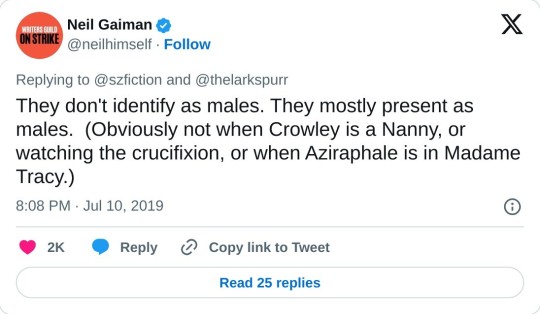
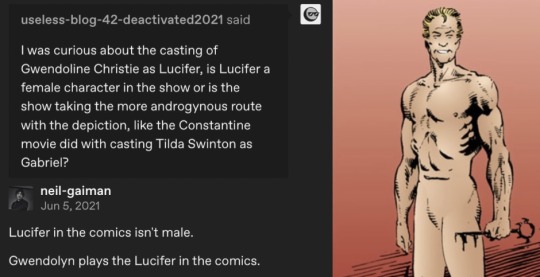
critical-gemini-hero (excerpt): "Good Omens is the first big show I’ve seen to basically avoid transphobia all together when the opportunity presented itself, and even say fuck you to the gender binary as a bonus."
Neil Gaiman (excerpt): "Thank you! That was definitely what we were going for."
(source)
So no, they quite literally do not have “male-sexed human bodies” and they do not ascribe to human gender norms.
In addition, what you are suggesting is that “being in a male human body” equates to “feeling male” and “feeling sexual” because “the body dictates internal experience.”
There are literally millions of people, actual human beings living in physical bodies, who (despite living in culture) still DO NOT feel that the gender assigned to their bodies is reflective of their lived, internal experience. Merely having physical attributes does not mean you have a corresponding internal experience. You can be forced by your parents, teachers, elders, peers and everyone else to FEEL a certain way because of your “sexed human body” but it won’t make it true inside you.
If one's internal experience were so unimportant, then we wouldn't have 82% of transgender individuals consider suicide (source) because of the stigma of trying to get out of the norms assigned to them because of their "sexed human bodies."
Aziraphale and Crowley have lived in history long enough to know how varied and complicated the concepts of gender AND sex have been historically. As spiritual beings, I think seeing how much humanity has varied in its ideas on sex and gender only confirms to them how unlike humans they are (with humanity’s obsession with genitalia, sex, reproduction… food, shelter, warmth, breathing––all things that angels and demons do not need to survive).
They love humanity, they love its pleasures and inventions, but they are still very much detached from it. Looking like humans definitely doesn't help them feel like humans at all. (Look at how they talk about us!)
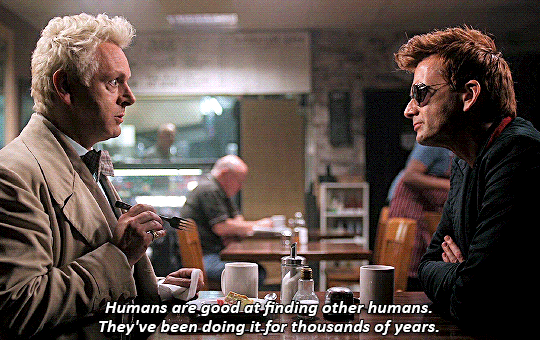
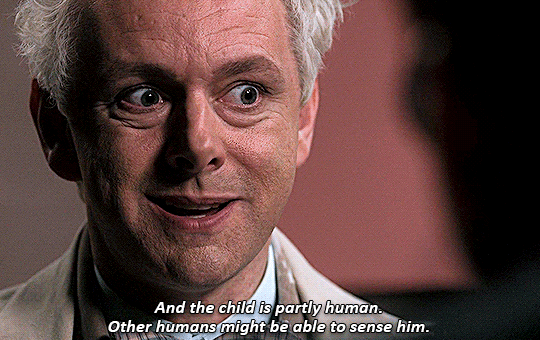
What are we, sniffer dogs??? They don't know what we feel like on the inside or how our biology works (we sure ain't sniffer dogs) because despite some surface appearances, they don't have the same internal experiences as us. Despite being here since the dawn of time. Despite looking like us in many ways.
They can magic up clothing and sideburns and eldritch heads to scare trigger-happy corporate men, and yet somehow gender and sex (as specifically Western-binary concepts) are something they'd totally get down with?
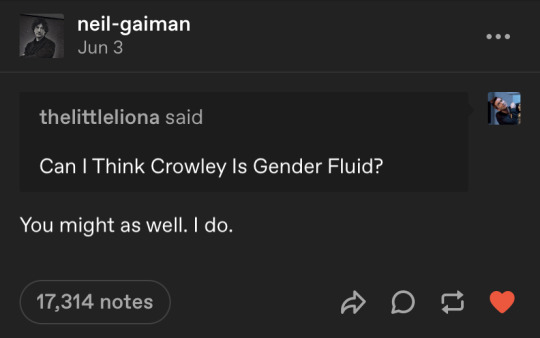
Also, your line of reasoning imagines people having no internal motivation or desire and suddenly get a tattoo and start to become a “bad person” or something. Yes, of course changing our bodies can affect our psychology, but our internal identity much more often influences our bodily choices than the other way around. I'm taking the drugs because I'm already depressed. I'm getting the tat because I want something cool on my body. I'm taking testosterone because I want my inner identity reflected in some ways on my physical body.
#this got long#good omens#good omens 2#THEY ARE NOT MALE HUMANS#genderfluid#queer#transgender#trans#lgbt#lgbtqia#asexual#nonbinary#neil gaiman#tagging the tags cuz I think this is important#go meta#good omens meta#ask#anon
354 notes
·
View notes